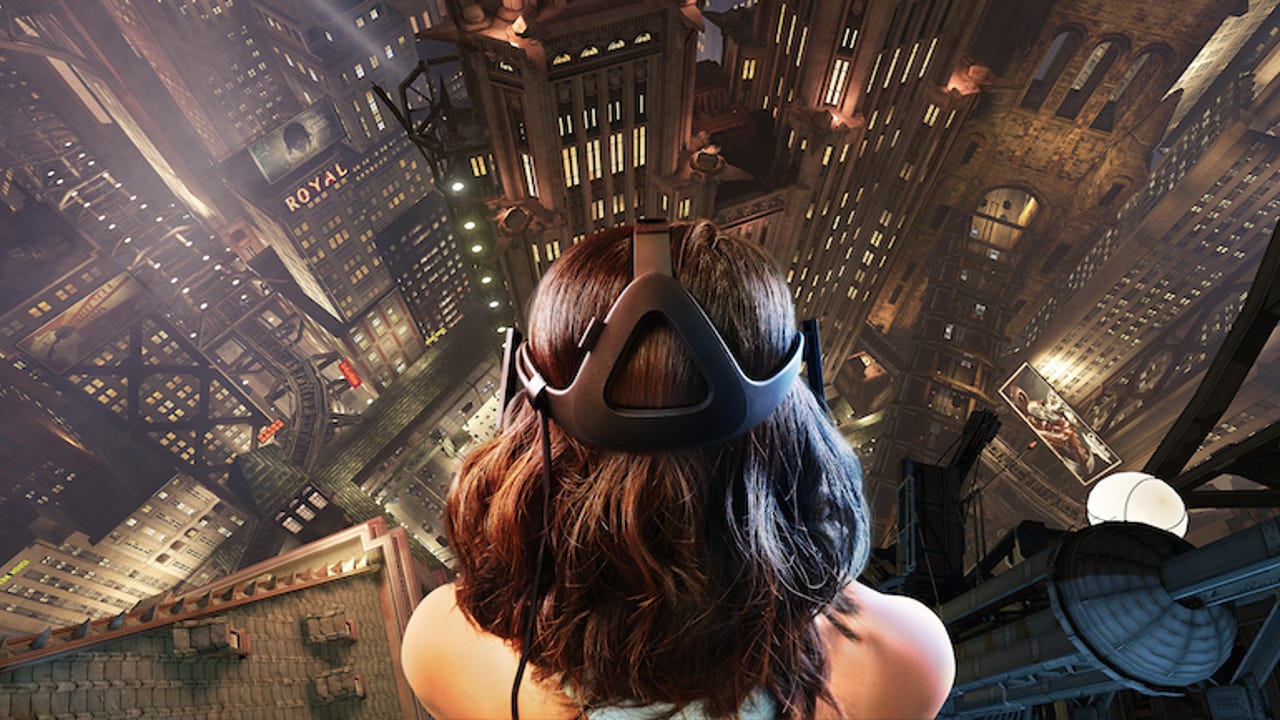VR is spectacular but lonely: Here's how it needs to change to succeed


As soon as the Rift headset is in place you're entirely surrounded by a virtual world.
Let's get this out of the way first. The Oculus Rift is a remarkable, intoxicating, mesmerising experience, and virtual reality, or VR, will almost certainly turn out to be one of the defining technologies of the next century -- but not quite yet.
I first tried out a VR headset perhaps a dozen years ago: it was like trying to play Pong while wearing a diving helmet. On a boat in a storm. At midnight. Drunk.
The Rift shows how much the state of the art has advanced. In a post-industrial hipster-infested warehouse -- inevitably not too far from Shoreditch in London -- I got a tour of some of the games and other 'experiences' being built for the headset.
Unlike 'mixed reality' devices such as Microsoft's HoloLens, where the virtual image only takes up a small amount of your field of vision, with Rift you are entirely surrounded by the digital world.
It's all kinds of fun. The Rift headset ('put it on like a baseball cap', I'm told) is still too heavy, but light enough to be manageable for long periods. As soon as the headset is in place you're entirely surrounded by a virtual world: look up, or down or turn around and it doesn't go away.
The images are bright, crisp, and clear, and I experienced neither lag nor motion sickness as I shook my head or swung around to look behind me.
The new Touch controllers might look like cyberpunk catapults, but felt remarkably comfortable in my hands, making navigation and interaction instinctive -- which it must be when you can't see your actual hands any more.
A breakthrough game?
Among the games on show, Robo Recall is the one that's being touted as a big breakthough for VR gaming, and it's certainly a lot of fun: shooting rogue androids (or breaking them to pieces with your bare virtual hands) is a vintage piece of arcade gaming, updated for VR.
What was more interesting was that after playing for maybe ten or 15 minutes, I finally gave up on my physical body. Jumping from place to place in the virtual world by teleport and spinning around to catch enemies creeping up behind me meant that I no longer knew -- or especially cared -- in which direction my physical body was pointing.
So considering how impressive the experience is on first-generation hardware, why aren't sales higher?
According to the stats from Canalys, only around two million pure VR headsets were sold last year (the analyst firm excludes viewers like Samsung's Gear VR and Google's Daydream). Of that two million, it's likely around 400,000 were from Oculus Rift (the company doesn't release data on its sales).
Part of the problem is undoubtedly the price. The Rift headset and controllers will cost you £600, while the PC to power it will cost at least the same again (and almost certainly significantly more), with a relatively limited set of games to play on it.
Facebook bought Oculus three years ago this month and when it did, the social network's boss was clearly already thinking beyond gaming.
"Imagine enjoying a court-side seat at a game, studying in a classroom of students and teachers all over the world, or consulting with a doctor face-to-face -- just by putting on goggles in your home," Mark Zuckerberg said.
Using a Rift conjures up a strange mix of emotions. I felt vulnerable because I was blind to what was going on in the real world, and totally reliant on others: thanks to the robotic battle fully filling my vision and my imagination, I was relying on my invisible chaperones to make sure I didn't walk into a wall.
Beyond gaming: shared experiences
After ripping robots to pieces with my bare hands and smashing castles to the ground with blazing fireballs, I tested out a different use of the headset: watching video rather than gaming. And that's when I felt lonely, looking at some really high-quality 360 videos of scenes from around the world.
In one I found myself standing alone in the desert. That's barely an exaggeration: even with the technology at this early stage, it felt almost as real as that.
I was there.
The ability of something like Oculus Rift to transport you, to tell new stories, is going to be a remarkable tool for sure. But for all the spectacle, I still felt lonely.
Perhaps that's because I was simply watching something (although that's not the best verb to use for such an immersive experience) rather interacting with the game which would keep my attention focused. Maybe it's because VR is now so close to creating a life-like experience that I wanted to engage with it like real life and to share it with others. That's hard to do right now.
When Zuckerberg bought Oculus Rift, he said: "This is really a new communication platform. By feeling truly present, you can share unbounded spaces and experiences with the people in your life. Imagine sharing not just moments with your friends online, but entire experiences and adventures."
I think that's another reason why VR is yet to hit the mainstream: it's still mostly a solitary technology, and it needs to become a social one. Facebook is ideally positioned to make that happen, and Oculus is already taking some steps in that direction. That's when the real impact will be felt.
More on virtual reality and augmented reality
- Microsoft HoloLens, hands-on: What it's like to wear the future
- Inside Microsoft's plan to make Windows the center of the 3D universe
- Microsoft fleshes out its Windows 10 mixed-reality roadmap
- Microsoft's HoloLens brings you inside a gigantic jet engine (CNET)
- What HoloLens means for Microsoft and for the future of augmented reality